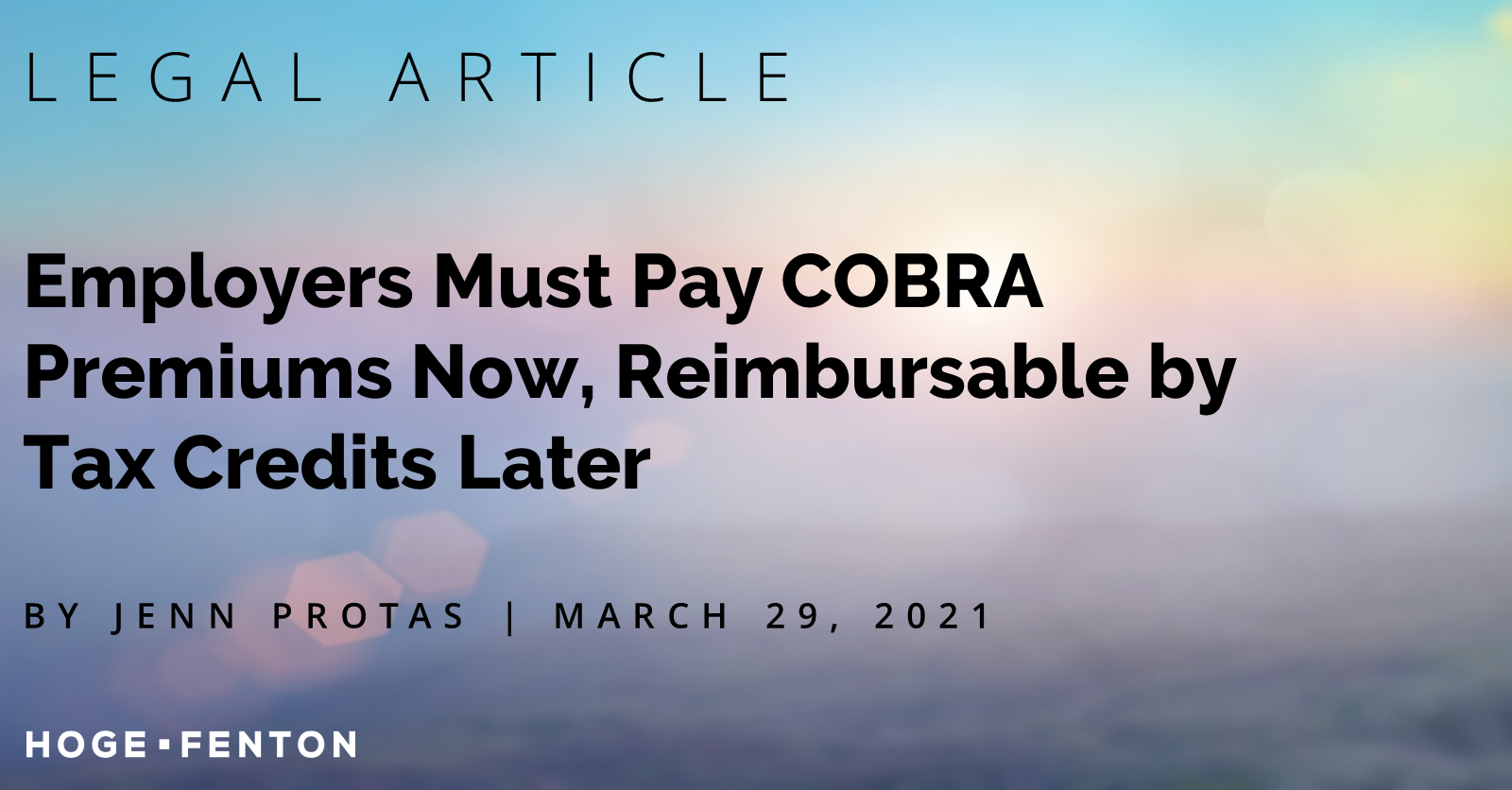Employers Must Pay COBRA Premiums Now, Reimbursable by Tax Credits Later
By Hoge Fenton | 03.29.2021 | Employment Law

On March 11, 2021, President Biden signed into law the American Rescue Plan Act of 2021 (“ARPA”). Among other things, the ARPA creates a federal subsidy covering 100% of COBRA premiums for certain employees and other qualified beneficiaries. COBRA premiums from April 1, 2021 through September 30, 2021 must now be paid by employers. Employers can be reimbursed through tax credits via their quarterly payroll tax filings.
What is COBRA?
The Consolidated Omnibus Budget Reconciliation Act (“COBRA”) gives eligible employees and their beneficiaries who lose their health benefits for qualifying reasons (such as job loss, reduced hours, or other life events) the right to choose to continue group health benefits provided by their group health plan for limited periods. These qualified individuals may be required to pay the entire premium for coverage up to 102% of the cost to the plan, which represents a huge increase in expenses for health benefits to individuals who are suddenly with less income. In the middle of the worst health pandemic in recent history, employees are losing their jobs or working fewer hours, and health benefits are more important than ever.
What is the COBRA Subsidy?
In recognition of the cost of COBRA premiums, the ARPA provides that “assistance eligible individuals” who timely enroll (either initially or during the special enrollment period) for COBRA coverage will be treated as having paid in full the amount of the COBRA premiums for eligible periods between April 1, 2021 and September 30, 2021 (“the Subsidy Period”). The ARPA does not extend the COBRA coverage period.
Who are “assistance eligible individuals?”
Assistance eligible individuals are those whose initial 18-month COBRA period (whether the individual initially elected COBRA coverage, did not elect COBRA coverage, or let their COBRA coverage lapse) includes some or all of the Subsidy Period and who (1) lost coverage under their employer’s health care plan due to a reduction of hours or involuntary termination (for reasons other than gross misconduct) and (2) elect COBRA continuation coverage—even if after receipt of notice of the subsidy. Employees who voluntarily terminated their employment are not eligible for the subsidy. An assistance eligible individual is no longer eligible for the subsidy upon (1) becoming eligible for other group health plan coverage or Medicare, (2) the expiration of the maximum COBRA period, or (3) the end of the Subsidy Period, whichever comes first.
Assistance eligible individuals during the Subsidy Period fall into one of three situations:
- Assistance eligible individuals who have already elected COBRA and are covered on April 1, 2021 do not need to do anything further to be covered by the subsidy.
- Eligible individuals who did not initially elect COBRA will be given a special enrollment period to elect coverage. This special enrollment period begins April 1 and ends 60 days after receipt of the COBRA subsidy notification. If these individuals elect COBRA coverage, the coverage will be retroactive to April 1, 2021 at no cost.
- Eligible individuals who let their COBRA coverage lapse but whose initial COBRA period extends beyond April 1, 2021 will be given a special enrollment period to elect coverage. This special enrollment period begins April 1 and ends 60 days after receipt of the COBRA subsidy notification. If these individuals elect COBRA coverage, the coverage will be retroactive to April 1, 2021 at no cost.
What must employers do?
Employers, or their benefits providers and third-party administrators, have some responsibilities, including the following:
- Employers should identify all assistance eligible individuals and provide required notices about the new benefit and the special enrollment period. The U.S. Department of Labor is working on model notices for these purposes.
- COBRA election notices for those eligible for the subsidy must include information related to the subsidies, among other information. Work with your benefits providers and third-party administrators to determine what specific information to include and to issue the notices.
- Individuals who are eligible for the special enrollment period must be provided notice of the opportunity to enroll (or re-enroll) by May 31, 2021.
- Assistance eligible individuals are entitled to notification of the subsidy termination date 15 to 45 days before the expiration.
- For assistance eligible individuals, employers must pay the COBRA premium owed during the Subsidy Period to a COBRA provider or plan administrator.
- Employers must also refund any premiums paid by employees during the Subsidy Period.
- Employers may then take a dollar-for-dollar tax credit on their quarterly payroll tax filings.
For more information or resources regarding COVID-related laws applicable to employers and/or employees, please refer to Hoge Fenton’s Employment Law Group’s resource page, or feel free to contact a member of the Employment Law Group.
Meet Our Employment Law Group
 |
Jenn Protas helps employers navigate California’s numerous employment laws and defends employers with an eye toward successful, yet cost-effective resolution. Jenn is a committed advocate for her clients and a tenacious litigator. She defends employers on matters related to wage and hour law, wrongful termination, harassment, discrimination, and retaliation in single-plaintiff litigation, Private Attorney General Act actions, and/or class actions. Jenn’s practice also includes housing discrimination matters and business litigation. |
 |
Sarju Naran is a zealous advocate for his clients and approaches litigation with creativity and strategy. Chair of Hoge Fenton’s Employment Law Group, Sarju’s experience spans from representing middle-market and family-owned closely held businesses to large multi-national companies. He regularly litigates and provides advice and counsel to companies on wage and hour issues, trade secret misappropriation, employee mobility, wrongful termination, performance management, and leaves of absence. |
 |
Maysa Saeed is an associate attorney whose practice focuses on employment counseling and litigation and assists clients in all aspects of employment law. Prior to joining Hoge Fenton, Maysa was a litigation associate with experience litigating various commercial, employment, and real estate matters. Maysa’s prior legal experience also includes defending insurance carriers in administrative trials before the Workers’ Compensation Appeals Boards in San Jose and Salinas. |
This information is provided as an educational service by Hoge Fenton for clients and friends of the firm. This communique is an overview only, and should not be construed as legal advice or advice to take any specific action. Please be sure to consult a knowledgeable professional with assistance with your particular legal issue. © 2021 Hoge Fenton









